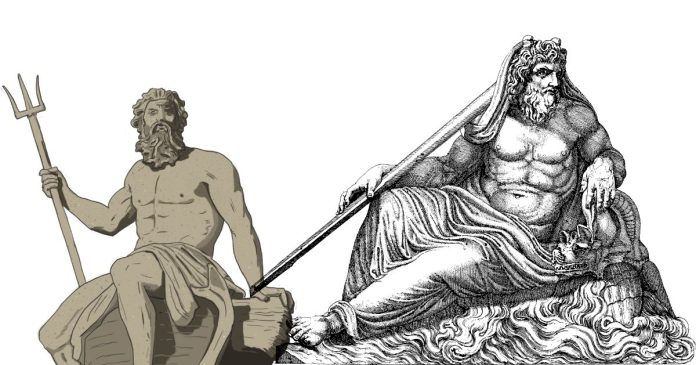In Greek mythology, the power dynamics among the gods have always fascinated audiences, especially when comparing two of the most prominent Olympians: Poseidon, the god of the sea, and Zeus, the king of the gods. Both are immensely powerful, each governing significant aspects of the natural and divine world. While they are brothers and equals in some respects, their domains, abilities, and myths reveal distinct levels of influence and power. So, who is more powerful? Let’s explore their roles, strengths, and mythological significance.
Zeus: King of the Gods
Zeus is widely regarded as the most powerful deity in Greek mythology. As the ruler of Mount Olympus, he wields authority over all gods and mortals. His domain includes the sky, thunder, and justice, making him the ultimate arbiter in divine and earthly matters.
Powers and Attributes of Zeus
- Control Over the Sky: Zeus commands lightning and thunder, symbolizing his ability to enforce order and instill fear.
- Supreme Authority: As the leader of the Olympians, Zeus is often seen as the god who resolves conflicts among the gods and enforces divine laws.
- Protector of Justice: Zeus oversees the moral order of the universe, ensuring that laws and promises are upheld.
- Shape-Shifting Abilities: Zeus frequently changes forms to interact with mortals, often using his powers for both seduction and manipulation.
Zeus’s Limitations
Despite his immense power, Zeus is not omnipotent. He is bound by the laws of Fate (known as the Moirai) and cannot alter predestined events. Additionally, his decisions often lead to conflict among gods and mortals, showing that his authority, while vast, is not absolute.
Poseidon: God of the Sea
Poseidon, Zeus’s brother, governs the seas, earthquakes, and horses. As one of the three main Olympian gods (alongside Zeus and Hades), Poseidon wields significant influence, particularly over the ocean and marine life. His trident is a symbol of his authority, capable of causing devastating storms or calming the seas.
Powers and Attributes of Poseidon
- Control Over Water: Poseidon commands the oceans, rivers, and all aquatic life, making him crucial to the survival of sailors and coastal communities.
- Earthquakes: Known as the “Earth-Shaker,” Poseidon’s ability to cause earthquakes demonstrates his power over the land as well as the sea.
- Creation of Creatures: Poseidon is credited with creating the horse and other mythical creatures, showcasing his creative and destructive capabilities.
- Ruler of the Seas: While Zeus governs the skies, Poseidon rules the seas, which were of immense importance to ancient Greek civilization.
Poseidon’s Limitations
Poseidon, despite his vast power, is often portrayed as more temperamental and less politically savvy than Zeus. His impulsive nature sometimes leads to grudges and conflicts, as seen in myths like the Trojan War, where he sided against the Trojans out of personal spite.
The Power Dynamics: Zeus vs. Poseidon
When comparing Zeus and Poseidon, their respective domains and mythological roles offer insights into their power dynamics:
- Hierarchy and Authority:
Zeus is the eldest of the Olympians and holds the position of king of the gods. This status gives him authority over Poseidon, who must defer to Zeus’s rulings in disputes. For example, when the gods debated their involvement in the Trojan War, Zeus’s decisions were final. - Domain Influence:
Poseidon’s influence is immense within his realm—the seas—but it is limited compared to Zeus’s dominion over the sky and his overarching leadership of the Olympians. Zeus’s role as the enforcer of justice and divine order extends to all realms, including Poseidon’s. - Symbolic Power:
Zeus symbolizes universal authority and balance, while Poseidon represents the chaotic and unpredictable forces of nature. While Poseidon’s power is formidable, it is often portrayed as subordinate to Zeus’s control. - Mythological Conflicts:
In some myths, the rivalry between Zeus and Poseidon is apparent. For example, the two once vied for the favor of mortals and divided the cosmos among themselves (and Hades). Zeus claimed the heavens, Poseidon took the sea, and Hades was left with the underworld. Despite this division, Zeus’s authority as king supersedes Poseidon’s influence.
Who is More Powerful?
While both Zeus and Poseidon possess incredible power, Zeus is generally considered more powerful due to his role as the king of the gods and his broader domain of influence. Poseidon, though immensely strong in his own right, operates within the confines of his realm and often defers to Zeus’s decisions.
However, it’s important to note that power in Greek mythology is not absolute. Each god plays a vital role in maintaining the balance of the universe. Poseidon’s control over the seas and earthquakes makes him indispensable, while Zeus’s authority ensures order among gods and mortals. Together, they embody different aspects of the natural world, reflecting the complexity of power in Greek mythology.


